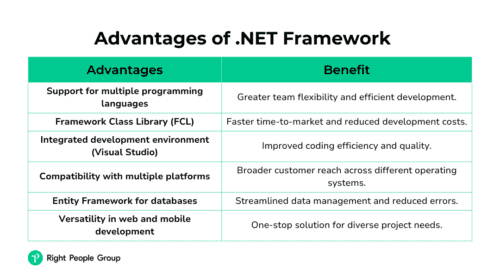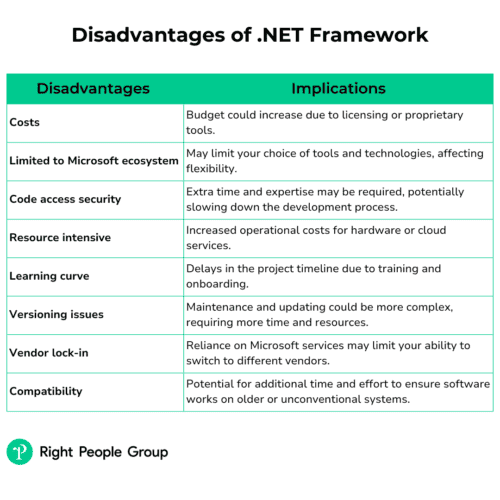What is .NET and why businesses are using it over other frameworks
If you’re a business owner looking to venture into the world of software development, you’ve likely heard of the .NET framework.
It’s a big name in the industry, but what is it really, and why is it becoming the go-to option for many businesses?
In this article, we’ll look at the core components of .NET, advantages and disadvantages of .NET framework, and why it could be the right choice for your enterprise.
What is .NET framework?
.NET Framework, .NET Platform, or .NET, is a software development framework developed by Microsoft. It’s designed to support multiple programming languages like C#, Visual Basic, and F#.
At its core, the .NET framework is built around the Common Language Runtime (CLR), a virtual machine that manages code execution.
It also comes with a rich Framework Class Library (FCL) that offers a wide range of pre-coded solutions and tools to simplify development tasks.
Range of applications you can build with .NET framework
One of the compelling aspects of the .NET framework is its versatility in application development.
Whether you’re a small business or a large enterprise, .NET provides the tools to cater to a wide variety of project types.
Here are some of the kinds of applications you can build using .NET:
Desktop applications
.NET offers technologies like Windows Forms and Windows Presentation Foundation (WPF) for creating rich desktop applications. These are ideal for business solutions that require a robust and feature-rich user interface.
Web applications
For web development, .NET provides ASP.NET, a framework perfect for building dynamic websites, web apps, and services.
Whether you’re creating an online retail store or a complex business application, ASP.NET is more than capable.
Mobile applications
Mobile development is another area where .NET shines. With technologies like Xamarin, you can develop cross-platform mobile applications that work on Android, iOS, and Windows devices.
Cloud-based applications
The .NET framework integrates well with cloud services, making it easier to build scalable and secure cloud-based applications. With Azure, Microsoft’s own cloud service, the process is even more seamless.
Internet of Things (IoT)
.NET provides libraries and frameworks that can help you dive into the Internet of Things. From smart home devices to industrial IoT, .NET has the capacity to manage it all.
Game development
While it might not be the first choice for game developers, .NET offers libraries and tools that can be used in game development. Unity, a popular game development engine, allows for C# programming, one of the languages supported by .NET.
Microservices
For businesses looking to develop microservices, .NET Core is an excellent choice. It offers the speed and flexibility required to manage and deploy small services independently.
APIs
Creating robust and secure APIs is crucial for any modern business, and .NET provides all the necessary tools to develop APIs that can efficiently transmit data between different parts of your business or even different businesses.
In short, the .NET framework can be used for a multitude of project types, from simple web apps to complex, large-scale business solutions. This versatility makes it a valuable tool for businesses looking to solve a variety of software development challenges.
Advantages of .NET framework
The .NET framework offers a range of features that promote efficiency, flexibility, and scalability, all important factors in today’s competitive marketplace.

Support for multiple programming languages
Think of programming languages as different kinds of tools in a toolbox. .NET offers a variety of these tools, such as C# and Visual Basic, so your team can choose the one they’re most comfortable with.
The beauty here is that even if different team members use different languages, they can all work together seamlessly on the same project.
This flexibility can lead to more efficient development and a better end product.
Framework Class Library (FCL)
Imagine you’re building a house and you have a set of pre-made building blocks.
The .NET Framework Class Library is somewhat like that; it gives developers a variety of pre-made solutions for common tasks.
This helps accelerate the development process, allowing you to get your product or service to market faster.
Additionally, it can cut down on development costs because a lot of the groundwork is already laid out.
Integrated development environment (Visual Studio)
Visual Studio, the primary tool for developing in .NET, is like an advanced workshop for your developers.
It comes with features that help identify issues in the code, suggests ways to improve it, and even provides shortcuts to make coding faster.
All these features work together to help developers be more efficient, which can, in turn, save your business both time and money.
Compatibility with multiple platforms and operating systems
The advent of .NET Core means that .NET is no longer just for Windows computers.
Now, you can develop software that runs on a variety of platforms including macOS and Linux.
This is a huge advantage if your business caters to customers who use different types of computers and devices.
Entity Framework for databases
Managing data is often one of the more challenging aspects of software development.
Entity Framework makes this easier by acting like a translator between your software and your database.
In essence, it simplifies the way data is accessed and manipulated, making the development process more straightforward and less error-prone.
Versatility in web and mobile development
The needs of businesses are diverse, and .NET is equipped to meet a wide range of these needs.
Whether you’re looking to create a dynamic website, a mobile app, or even a desktop application, .NET provides the necessary tools and technologies.
It offers specialized frameworks like Windows Forms for desktop applications and Windows Presentation Foundation for more advanced user interfaces.
This means that you can rely on .NET for multiple projects, making it a versatile investment for your business.
Disadvantages of .NET framework
Like any technology, the .NET framework comes with trade-offs, and understanding these will better equip you to navigate its complexities.

Costs
The .NET framework comes from Microsoft, a company known for premium products.
As a result, there might be expenses for using certain development tools or features.
However, Microsoft does offer a free, open-source version called .NET Core, which can be a cost-effective alternative.
Limited to Microsoft ecosystem
.NET has broadened its horizons with .NET Core, which works on different operating systems like Linux and macOS.
However, not all parts of the original .NET framework have this flexibility.
This could be a drawback if you’re looking to branch out from Microsoft’s suite of tools and services.
Code access security
Security is important, and .NET has features to safeguard your software.
The downside is that implementing these security measures can be complicated and may require expertise that’s outside of typical development skill sets.
Special training or hiring additional experts might be necessary.
Resource intensive
.NET applications can sometimes require more system resources compared to applications developed using other frameworks.
This could lead to higher costs for hardware or cloud services to run your software efficiently.
Learning curve
For teams unfamiliar with the Microsoft ecosystem or object-oriented programming, there can be a steep learning curve.
Time and resources would be needed for training, which might slow down the initial development process.
Versioning issues
.NET frequently releases new versions with improved features and security fixes.
While staying updated is generally a good thing, it can also break existing code if not managed carefully.
Businesses would need to allocate time and resources to manage these updates.
Vendor lock-in
The .NET framework is a Microsoft product, and though .NET Core has opened up more options, the framework still strongly encourages using other Microsoft services and tools.
This could limit your choices and make you more dependent on a single vendor for various services.
Compatibility
Older versions of .NET don’t always play nicely with newer updates or different operating systems.
If your business is using older systems or unconventional setups, you might encounter compatibility issues that require extra work to resolve.
Weighing the pros and cons: A balanced approach
After considering both the advantages and disadvantages of the .NET framework, it’s clear that while it’s a powerful tool, it may not be the right fit for every project or team.
One flexible and often cost-effective option is to work with a freelance .NET developer.
The advantages of working with a freelance .NET developer
Hiring a freelance .NET developer can be an excellent way to tap into the benefits of the .NET framework without the long-term commitment of a full-time employee. It allows you to be nimble and responsive to the specific needs of your business projects.
Flexibility
Freelancers offer flexibility that you might not get with a full-time employee. You can bring them in for specific projects or even just parts of projects, depending on your needs.
Expertise on demand
Freelance developers often possess specialized skills that are tailored to short-term or unique projects. They can offer a level of expertise that would be hard to find in a generalist full-time developer.
Cost-effectiveness
Hiring a freelancer can often be more budget-friendly than bringing on a full-time developer, especially if you’re not sure you’ll have ongoing .NET development needs.
Faster time to market
Because freelancers are used to jumping into projects, they can often get up to speed quickly, helping you get your product or service to market faster.
Alternatives to .NET
While .NET is a powerful choice for many businesses, it’s not the only option out there. Here are some alternative frameworks, along with a brief discussion of their pros, compared to .NET.
Java
Pros: Highly portable, as it’s designed to work across multiple platforms without modification. Java also boasts a large and active developer community.
Compared to .NET: Java is often seen as the main competitor to .NET. It’s equally robust but offers better cross-platform capabilities without relying on a specific variant like .NET Core.
Python
Pros: Known for its simplicity and readability, Python offers rapid development for various types of projects, from web applications to data analysis.
Compared to .NET: Python may be easier for beginners to pick up. However, it may not offer the same level of performance optimization that you could achieve with .NET, particularly for large-scale applications.
Ruby on Rails
Pros: This web development framework is known for its ease of use and rapid development capabilities. It also has a strong focus on clean and readable code.
Compared to .NET: Ruby on Rails is typically faster for getting a simple web application up and running, but may lack some of the enterprise-level features and scalability that .NET provides.
PHP
Pros: Widely used for web development, PHP is open-source and has a large ecosystem of hosting services and tools. It’s also straightforward to deploy.
Compared to .NET: PHP is generally easier and cheaper to host than .NET. However, it’s mostly confined to web development and doesn’t offer the broad application development capabilities of .NET.
Go
Pros: Known for its performance and efficiency, Go is increasingly popular for system-level programming and has a simplified syntax.
Compared to .NET: Go offers a lightweight alternative for backend services but doesn’t have the extensive Framework Class Library (FCL) that .NET offers for a range of development needs.
Node.js
Pros: Great for building scalable network applications, Node.js is known for its speed. It’s also built on JavaScript, which is commonly used for front-end development.
Compared to .NET: Node.js can be more efficient for real-time applications, like chat applications or online gaming. However, it may not be as well-suited for CPU-intensive tasks compared to .NET.
Why businesses prefer .NET
Let’s take a closer look at why so many companies go for .NET development when it comes to their software needs. We’ll break down the key points that make this framework a top choice for both small and large businesses.
Object-oriented programming
Object-oriented programming helps you keep your code clean and organized. It’s easier to update and manage, especially for big projects that will last a long time.
Easy to scale
.NET is built to handle growth. As your business gets bigger, your software can grow without a hitch. You won’t need to start from scratch with a new system.
Resource availability
Because .NET is popular, there are lots of skilled developers out there. You’ll have an easier time finding the right people to hire.
Industry adoption
Big companies use .NET. When you see industry leaders using it, you can feel more confident it’s a reliable choice for your business.
In short, .NET is popular for good reasons. It’s easy to manage, it can grow with your business, there’s a big talent pool, and it has a track record of reliability.
How to find a qualified and experienced freelance .NET developer
Here at Right People Group, we specialize in matching businesses with freelance .NET developers who have the skills to meet your specific needs. Collaborating with a freelancer can provide customized solutions, help you sidestep common challenges, and ensure your software project is optimized for efficiency and scalability.
Intrigued? Reach out to us to quickly find the .NET expert who can best meet your business requirements.

Conclusion
The .NET framework offers a feature-rich environment for software development. Its support for multiple programming languages, extensive Framework Class Library, and versatility across different platforms make it a compelling choice for many businesses. However, it’s crucial to consider both the advantages and disadvantages of the .NET framework when making your decision.
Software architecture design
We provide software architecture services to design and implement scalable, custom solutions that align with your business objectives and technical requirements.
Umbraco 7 development
We deliver Umbraco 7 development expertise, creating robust and customized content management solutions that perfectly align with your business requirements.
.NET backend development
We provide skilled .NET backend developers who specialize in building robust and scalable enterprise applications tailored to your specific business needs.
Episerver consulting and development
We combine our Episerver expertise with innovative development capabilities to create tailored digital solutions that enhance your business's online presence and drive engagement.
Composite C1 web development
We connect you with skilled Composite C1 developers who deliver tailored, powerful web solutions that align with your business needs.
IT architecture and solutions design
We implement efficient IT architecture solutions tailored to your business needs, designing and optimizing technological infrastructures that support your strategic objectives while ensuring scalability and security.
Need an expert consultant?
Get highly specialized IT and business consultants with deep technical and professional knowledge. We offer flexible solutions for both individual consultants and complete teams.
17+
years experience in the IT- and business consulting industry.
50+
dedicated employees
500+
consultants on assignments
15.000+
pre-screened consultants
Find consultants
Services
About us
Copyright © 2025 Right People Group. All rights reserved.
